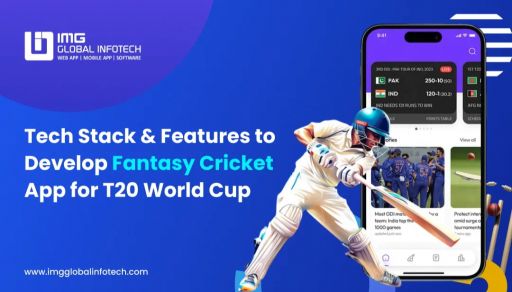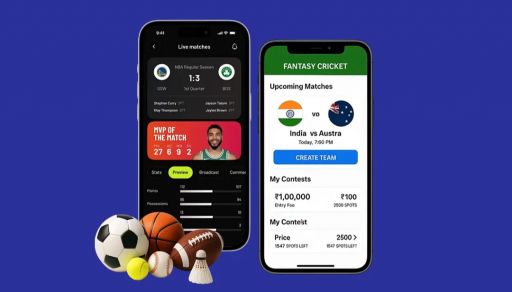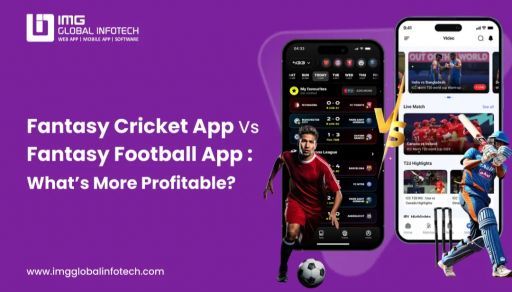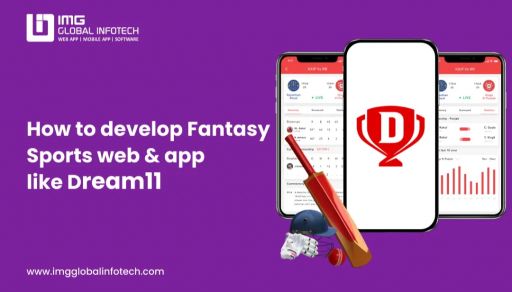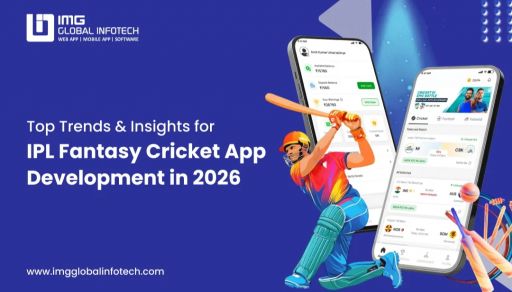Develop Your Own Real-Time Fantasy Cricket App For 2026
Dipti Singhal
Jul 25, 2025

Cricket continues to be at the center of the burgeoning fantasy sports market, particularly in nations like India where millions of fans actively compete in fantasy leagues. Real-time fantasy cricket apps are becoming more and more popular as 2026 draws near. Fans yearn for the excitement of running virtual teams and competing live during games, whether it's the IPL, international series, or local leagues. Now is the ideal time to create your own real-time fantasy cricket app if you want to take advantage of this profitable market.
Everything you need to know about creating a scalable, entertaining, and high-performing fantasy cricket platform will be covered in this blog. Building a feature-rich fantasy app can provide your startup or company with a significant competitive edge in 2026, from real-time data integration and user-friendly UI/UX to sophisticated features like player stats, contests, live score sync, and secure payment gateways. This guide will assist you in understanding the essential steps and elements needed to succeed in this quickly changing market, regardless of your background as an investor, entrepreneur, or sports tech enthusiast. Let's explore the entire fantasy cricket app development process and features that will set your app apart in 2026.
Why Choose Real-Time Fantasy Cricket App Development in 2026

The rise in user demand for real-time updates and dynamic engagement in 2026 makes developing real-time fantasy cricket apps a wise decision. Users today demand interactive gameplay that replicates the thrill of on-field action, real-time leaderboards, and live score integration. Because cricket leagues like the IPL, ICC World Cup, and domestic tournaments are so popular, traffic increases dramatically during events, which gives fantasy platforms enormous opportunities. Furthermore, it is now simpler than ever for users to sign up, play, and conduct transactions without any problems thanks to India's rapidly increasing mobile internet penetration and the broad use of safe digital payment methods.
Fantasy sports companies can increase user retention, increase revenue, and maintain an advantage over rivals by investing in real-time app features. Real-time fantasy cricket app development in 2026 is crucial if you want to thrive in the rapidly changing digital sports era.
Must-Have Features for a 2026-Ready Fantasy Cricket App
With intense competition and changing user needs, the fantasy sports market—particularly fantasy cricket—continues to expand as 2026 approaches. Making sure your fantasy cricket app has the most up-to-date and user-friendly features is essential to its success.
Here’s a breakdown of the must-have features that will make your fantasy cricket app 2026-ready:
1. Real-Time Match Integration
Your app should be powered by live data feeds to allow real-time score updates, player statistics, and fantasy point calculations. This ensures users stay engaged and receive accurate insights during the match.
2. AI-Powered Player Suggestions
Leveraging AI to offer predictive player suggestions based on recent form, pitch report, and weather conditions gives users an edge while creating their team, enhancing engagement and retention.
3. Multiple Contest Types
In 2026, users expect variety. Include multiple contest options such as mega contests, head-to-head, private leagues, and practice games to cater to casual users and serious players alike.
4. In-App Live Chat & Social Sharing
Adding a chat feature enables users to communicate within leagues, increasing app stickiness. Integration with social media helps users share winnings and invites, bringing organic growth.
5. Voice Assistant for Navigation
Implement a voice-enabled assistant to simplify navigation and enable hands-free app usage. It’s a game-changing accessibility feature for busy users or multitaskers.
6. Gamification with Rewards & Badges
Introduce a gamified experience with XP points, badges, and daily tasks. This encourages users to return to the app daily and improves long-term retention.
7. Crypto & UPI-Based Wallet Integration
Offer seamless deposit and withdrawal options using UPI, cards, and even cryptocurrencies. This enhances user trust and matches the fintech trends of 2026.
8. Multi-Sport & Multi-Language Support
Allow users to switch between cricket, football, and other sports. Also, provide multi-language support to reach Tier 2 and Tier 3 users across India and globally.
9. Advanced Leaderboard with Live Ranks
An interactive leaderboard that updates in real-time boosts competitiveness and engagement. Include team analysis tools so users can learn and strategize better.
10. AI-Powered Anti-Fraud System
Ensure user safety and fair play with AI-based fraud detection that monitors multiple accounts, suspicious transactions, and manipulative gameplay patterns.
11. Custom Team Creation Rules
Provide flexibility in team creation like choosing players from specific leagues or under salary caps. Advanced users love customization options.
12. Fantasy News & Insights Section
Offer users real-time news, injury updates, pitch reports, and expert tips within the app to help them make informed decisions and stay glued to the platform.
13. Offline Draft Mode
Let users create and save their fantasy teams even in offline mode, syncing once they're back online. A crucial feature for users with inconsistent internet access.
14. Dark Mode & UI Customization
A modern UI with light/dark mode toggle and customizable themes gives users control over their visual experience and helps in reducing screen fatigue.
15. Push Notifications with Smart Reminders
Use intelligent push alerts for team deadline reminders, match results, wallet updates, and fantasy point milestones to drive timely user action.
Tech Stack You’ll Need in 2026
In 2026, the digital environment is expected to be more rapid, secure, and intensely real-time. Selecting the appropriate tech stack is essential for scalability, user experience, and long-term growth whether you're developing a social media app, e-commerce platform, or fantasy sports app. The key tech stack that you will require in 2026 is broken down as follows:
Frontend: Flutter 4.0 / React Native
In 2026, cross-platform development dominates mobile and web. Flutter 4.0 offers blazing-fast UI rendering, a single codebase for all platforms, and tighter integration with desktop and embedded systems. Meanwhile, React Native remains a developer favorite for its mature ecosystem, reusability, and active community. Choose based on your project’s scale and UI complexity.
Backend: Node.js / Django
For real-time applications and scalable APIs, Node.js continues to be a top choice thanks to its event-driven, non-blocking architecture. On the other hand, Django, the high-level Python framework, is ideal for projects needing rapid development, robust security, and a clean admin interface.
Database: PostgreSQL / MongoDB
For structured data and complex queries, PostgreSQL offers reliability and strong ACID compliance. It's perfect for financial, transactional, or enterprise-level systems. For more flexible and scalable applications dealing with JSON, unstructured data, or high traffic, MongoDB provides a NoSQL alternative with exceptional horizontal scalability.
Real-Time: WebSockets, Firebase, Socket.IO
Modern apps demand instant data delivery. WebSockets provide a persistent connection ideal for real-time chat or live scores. Firebase handles real-time databases and notifications with minimal backend effort. Socket.IO, built on top of WebSockets, simplifies real-time communication for Node.js applications.
APIs: Cricket API (CricAPI, SportMonks, RapidAPI)
For fantasy or cricket-based applications, integrating live data is crucial. CricAPI, SportMonks, and RapidAPI offer reliable cricket APIs delivering real-time match scores, player stats, and team updates. These are essential for driving engagement and ensuring accuracy in sports-based platforms.
Payments: UPI, Razorpay, Stripe, PayPal
Seamless and secure payments are the backbone of any digital product. UPI dominates the Indian payment ecosystem, while Razorpay offers comprehensive solutions including subscriptions and payment links. Globally, Stripe and PayPal continue to be trusted choices for integrating multi-currency payments with fraud protection.
Security: OAuth2, SSL, Anti-fraud AI
Security remains non-negotiable in 2026. OAuth2 ensures secure user authentication for third-party logins. SSL encryption protects data transmission, while advanced AI-based anti-fraud systems detect and mitigate suspicious behavior, especially in fintech and e-commerce domains.
Legal & Regulatory Compliance for 2026: What You Must Know
As the digital and gaming industries in India expand rapidly, businesses must navigate a complex legal environment. In 2026, staying compliant isn’t optional — it’s fundamental for survival and growth. Here’s an overview of key compliance areas every gaming and tech platform must consider:
1. Understanding Indian Gaming Laws: The Skill vs. Chance Debate
Indian gaming laws draw a clear line between games of skill (legal in most states) and games of chance (largely prohibited under gambling laws). This distinction is crucial. Courts have upheld that fantasy sports and strategy-based games fall under skill, thus not being classified as gambling. However, state-wise regulations vary. Businesses must monitor evolving interpretations and state-level bans or permissions, particularly for real-money games.
2. Data Protection Compliance: DPDP Act & GDPR
With the Digital Personal Data Protection (DPDP) Act, 2023 now enforced, companies operating in India must ensure responsible handling, consent-based processing, and secure storage of user data. International platforms also need to align with GDPR if serving EU residents. Key mandates include:
-
Clear data processing policies.
-
Appointment of a Data Protection Officer (DPO).
-
Prompt breach reporting and user data rights handling.
3. Licensing and KYC/AML Integrations
For platforms handling financial transactions or real-money gaming, licensing and regulatory approvals are critical. Complying with Know Your Customer (KYC) and Anti-Money Laundering (AML) guidelines helps maintain platform integrity and builds trust. Integration of Aadhaar-based eKYC, PAN verification, and AI-based risk monitoring systems is now standard for top platforms to ensure legitimacy and prevent fraud.
Estimated Cost to Build a Fantasy Cricket App in 2026
Building a fantasy cricket app in 2026 involves several factors such as features, real-time data integration, user interface, and backend scalability. Here's a breakdown of estimated costs based on the app’s complexity:
-
Basic Level App (₹4 to ₹6 Lakhs):
Includes standard features like user registration, player selection, leaderboard, and admin panel. Ideal for startups or MVP versions.
-
Medium Level App (₹6 to ₹12 Lakhs):
Offers enhanced UI/UX, real-time score updates, payment gateways, and multiple contests. Suitable for mid-sized platforms seeking competitive engagement.
-
Advanced Level App (₹12 to ₹20 Lakhs):
Packed with AI-driven analytics, custom APIs, advanced security, multiple game formats, and scalability for high traffic. Best for enterprise-grade apps.
These cost estimates may vary depending on the development team, location, and post-launch maintenance requirements.
Read More: Top Trends & Insights for IPL Fantasy Cricket App Development
Future-Proof Monetization Strategies for Fantasy Sports Platforms
As the fantasy sports industry continues to evolve, it’s critical to implement monetization strategies that are not just profitable today but also scalable and future-ready. Here’s a breakdown of the most effective and emerging monetization models that can future-proof your platform:
1. Entry Fees & Contests
One of the most direct and proven revenue models is charging entry fees for paid contests. Players join leagues or tournaments by paying a small amount, which accumulates into a prize pool. A portion of this pool (usually 10-20%) goes to the platform as commission or “rake.” This model ensures consistent cash flow and engages serious fantasy sports enthusiasts who are willing to pay for competition.
2. Ads & Sponsorships
Advertising remains a powerful monetization method, especially when user traffic is high. By integrating banner ads, native promotions, or branded content within the app, platforms can generate revenue through impressions and clicks. Additionally, forming partnerships with sports brands or companies targeting the same demographic can lead to lucrative sponsorship deals that boost brand credibility and income.
3. Premium User Subscriptions
Offering tiered subscription plans with added benefits—like ad-free experience, advanced analytics, early access to contests, or personalized insights—encourages users to upgrade. This model fosters long-term revenue and builds a loyal customer base that values exclusive features.
4. NFTs & Fantasy Player Trading (Emerging Trend)
Blockchain technology is introducing a new frontier in fantasy gaming. Users can now own, trade, and collect digital player cards in the form of NFTs (Non-Fungible Tokens). These assets have real-world value and can be used for fantasy player trading, team-building, or limited-edition collectibles. This emerging trend adds a gamified investment layer to fantasy sports, attracting both gamers and crypto-savvy investors.
Choosing the Right Development Partner
For a fantasy sports app to be successful, choosing the right development partner is essential. A seasoned business like IMG Global Infotech has a distinct advantage because of its technical know-how, flexible development methodology, and in-depth knowledge of the fantasy gaming industry. IMG, which has a history of producing secure and scalable apps, guarantees that your project will take advantage of real-time data integration and industry best practices.
Several top fantasy cricket apps with excellent UI/UX design, smooth user interaction, and real-time match updates are part of their portfolio. These case studies show how IMG can adjust to various client visions and produce apps that are not only useful but also prepared for the market. Working with a reputable business saves time, lowers risks, and yields long-term benefits.
Conclusion
With real-time fantasy cricket apps becoming increasingly popular, 2026 offers an unparalleled chance to take advantage of the rapidly changing fantasy sports market. You can build a platform that stands out in this crowded market by combining real-time data, interesting features, and a user-centric experience. Developing your own fantasy cricket app now guarantees you're ahead of the curve, regardless of whether you're aiming for international tournaments, regional leagues, or IPL fans. It is now easier than ever to turn your dream app idea into a profitable, scalable business with the correct tech stack, legal compliance, and development partner like IMG Global Infotech. Start now to take the lead in 2026.
-
 Hire Gold Investment App Developers: Cost, Skills & Benefits
Hire Gold Investment App Developers: Cost, Skills & Benefits
-
 Thinking of Building a Fintech App? A Complete Guide to Features, Costs, and Success
Thinking of Building a Fintech App? A Complete Guide to Features, Costs, and Success
-
 Top 10 Logistics Software Development Companies to Hire in 2026
Top 10 Logistics Software Development Companies to Hire in 2026
-
 Top Fintech Apps in India in 2026
Top Fintech Apps in India in 2026
-
 Top Fintech Trends to Accelerate Business in 2026
Top Fintech Trends to Accelerate Business in 2026
-
 Cost to Develop a Logistics App in 2026: A Step-by-Step Budget Guide
Cost to Develop a Logistics App in 2026: A Step-by-Step Budget Guide
Dipti Singhal is a skilled Content Writing Specialist at IMG Global Infotech, with strong expertise in creating engaging, SEO-optimized content for various industries. She focuses on blending storytelling with effective keyword strategies to help businesses connect with their audience and improve their online visibility. Passionate about delivering high-quality content that drives real results, Dipti plays an essential role in strengthening the company’s digital presence.


